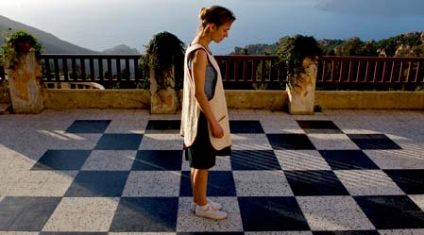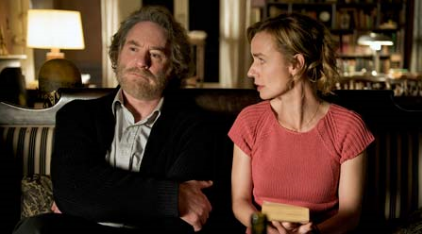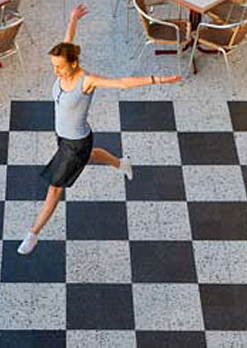4-26-09
When
Two Heads Are Better than One:
Caroline
Bottaro’s Queen to Play
By Diane Sippl

Five-and-a-half years ago, when Caroline Bottaro’s
next-door neighbor dropped in to share a book she’d just finished creating and
ask for a critique, could Bottaro, the screenwriting partner of Jean-Pierre
Améris, possibly have known that she would turn this first novel into such an
inspiring feat for her own first feature as a filmmaker? She’d made one short film, La Mère (1995), starring Nathalie Baye
who, according to producer Dominique Besnehard, was the “grandmother” of the
idea to launch Joueuse as Caroline
Bottaro’s directorial debut. Adapting
Bettina Heinrich’s La Joueuse d’Echecs (The Chess Player — note the feminine in
the French title), Bottaro would team up with not only her Parisian neighbor but
also Besnehard, the actor and casting director-turned-producer who would bring
her Sandrine Bonnaire to play the lead.
It would be the second time the actress had performed a role in a
screenplay adapted from a novel by Bottaro, who had written the award-winning C’est La Vie (2001) based on Marie de
Hennezel’s La Mort Intime, which
provided a luminous character for Bonnaire to play — an art teacher for a man
who had come to a hospice center to die.
Caroline Bottaro, Sandrine Bonnaire, and also the
male lead in Joueuse, the elegant and
charismatic Kevin Kline, attended the Tribeca Film Festival in
In a post-screening Q&A at the Tribeca festival, Caroline Bottaro told the audience, “Chess is associated with men, with the elite. It’s an intellectual game… but I wanted to show how a woman from a humble background could learn to play and become a stronger player even than the man who teaches her. It’s a film about internal change, empowerment, and evolution.”
“Caroline came from a background in literary studies,” Besnehard told the audience in the Q&A after the COL-COA screening of Queen to Play. “After she met Jean-Pierre Améris and worked for many years under his wing (he directed and co-wrote the screenplay with her for C’est la Vie), eventually she became emancipated, and I think there is a parallel, probably, between Queen to Play and her own story as an assistant working by the side of a very busy director and a bit in his shadow until the day when she took her own flight.”
“The film was shot entirely in

Dominique Besnehard met Sandrine Bonnaire during her
ingénue role as a teenager in Maurice Pialat’s A Nos Amours (1983), as he was playing her older brother. “When I knew her then she was a bit naïve, a
kind of “goody-two-shoes,” he remarked, “but she grew up to become a fantastic
actress.” Besnehard continued acting and
working as a casting director and agent until 2007. “Joueuse
has been my first job as a producer,” he reflected, “and in my encounter
with Christine Bonnaire once again, there is something magical.”
Remarkable for her trademark intensity, as cerebral as
it is emotional, Bonnaire still peers portentously at the targets of her
vision, her face like a seismograph of events at hand as her left eye cocks a discerning
brow. “Do you always
look at someone as if your life depended on what he’s about to say?” the
retired Dr. Kröger asks her in Queen to
Play. “Smile once in awhile… it
can’t hurt,” he advises her. Not
withstanding the fact that Bonnaire’s cheek flashes a beguiling dimple as her
smile transforms her utterly, his remark would register as a typically male
taunt-like flirtation if it weren’t for the line in À Nos Amours that Pialat himself (who plays her father) says to the
young actress in her film debut as a girl undergoing the erratic change from
innocence to experience, “You never smile any more.” While in À
Nos Amours Bonnaire is a daughter rebelling against an overbearing father
and an ineffectual mother in a Parisian family, in Queen to Play, Bonnaire is that effete mother to a rebellious daughter
— at least at the outset. Not to stretch
a point, Queen to Play and À Nos Amours can be viewed as bookends
in the sense that the earlier film opens with her as an adolescent stretching
out from a boat bow pulpit over the water, ready to spread her wings, so to
speak, and the recent film ends most satisfyingly with her poised queen-like as
a masthead (think Greta Garbo in Queen
Christina, if not the powerful chess figure) on the bow of the boat that
takes her from Corsica to the mainland as she heads for Paris.
“The queen is the most important player — she can
move in any direction and go as far as she wants,” Dr. Kröger
(Kevin Kline) informs Hélène (Sandrine Bonnaire) in Queen to
Play. And he is in a position to
tell her this only because she has sought him out. A chamber maid in a beautiful hotel on a
hilltop of the

In chess the king is weak in the
sense that he relies on defense by the others — the queen, rooks, bishops, knights, and
pawns. The queen can lead all of these forces if she creates a clear path of maneuvers and follows it. Hélène’s passion becomes an obsession, we
could say, to create this path. Kröger
accepts her demand to be her mentor, and she begins to behave like an addict:
every surface is a chessboard for her (not unlike the way that every open space
is a soccer field for some boys and men).
Out to dinner with her husband, she moves morsels of food into various
positions on the cleared table. At home,
she shifts the toiletry bottles on her bathroom counter. Mopping a tile floor, she herself becomes a
chess figure, her body edited from one square to another. Add to this
Dr. Kröger tells her chess is about more than
knowing the right plays; it’s also how
you play that matters. “The threat is
stronger than the execution,” he advises her, a tip she remembers as she
competes in her first tournament. She
and Kröger become so intuitively mated to each other through the board that
they carry on a most intimate dialogue, late in the film, strictly through
one-phrase exchanges of number-coded chess moves. Like two doves cooing, it’s their way of
exchanging admiration. Yet it’s also
their way of learning about life.
Discipline, focus, and staying the course all bring confidence in the
art of living. As Dr. Kröger discreetly
remarks of his deceased artist wife, “Her doubts were stronger than her
painting.” On the other hand, his
respect and restraint are stronger than his whims. Both Hélène’s point of view and her mode of
expression come to be governed by the rules of the game, but that’s not
all: more significantly, her
metamorphosis extends to her relations with her family, her friends, and her
employer as she begins to “play” life with the lofty self-esteem, committed
finesse, and high-minded vision of its most empowered figure, herself.
Queen to Play
Director: Caroline Bottaro; Producers: Dominique Besnehard, Michel Feller, and Amelie Latscha; Screenplay: Caroline Bottaro, Caroline Maly, and Jeanne Le Guillou; Original Novel: Bettina Heinrich; Cinematography: Jean-Claude Larrieu (AFC); Editor: Tina Baz Le Gal; Original Music: Nicola Piovani; Production Designer: Emmanuel de Chauvigny.
Cast: Sandrine Bonnaire, Kevin Kline, Jennifer Beals, Valérie Lagrange, Francis Renaud, Laurence Colussi, Didier Ferrari, Alexandra Gentil, Dominic Gould, Daniel Martin, Alice Pol, Élisabeth Vitali.